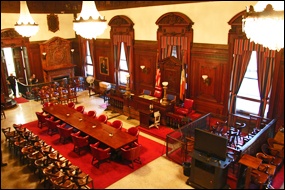How Long Does Probate Take in New York?
At the onset of the probate case, everyone wants to know how long does probate take, and rightly so. In our experience, an average probate case in New York takes about a year to complete.
You can look at the probate process as having three stages – (1) appointment of the executor, (2) settlement of the property and (3) closing. The approximate time for each stage:
- about 3 months to be appointed the executor
- about 6 months to settle the estate
- about 3 months to close the estate
Total: about 12 months
Each stage has its typical tasks and routine delays. Each stage can also have major delays. Significant delays are less common, but they can have a major effect on how long your probate case will take.
How long does it take to get appointed as an executor – about three months

Getting appointed as the executor takes about 3 months. There are quite a few tasks to be done at this stage. Each of those steps can take from a week to a month to complete. The good news is that some of those tasks can be done simultaneously or out of order by an experienced estate attorney to make your probate go faster.
To get appointed as the executor, you must go through the following:
- find a New York estate lawyer and set up the appointment
- get the death certificate
- gather information for the estate lawyer
- wait for the estate lawyer to prepare the documents
- sign the documents
- your lawyer will send notices to parties entitled to notice
- your lawyer will send waivers for people to sign
- wait for your lawyer to review the packet and file it with the court
- wait for the court to process the documents and set a hearing date
- have your lawyer show up at the hearing date
- wait for the court to process the file and to appoint you as the executor
Routine Delays in Getting Appointed
Many of the typical delays in getting appointed as the executor can be avoided with the help of an experienced New York estate lawyer. They include:
- Difficulty getting a death certificate – this is especially true if the death occurred outside of the U.S. or different state, but can also happen due to delays from the funeral home or the Department of Health and Mental Hygiene.
- Missing information – you wouldn’t necessarily have all the required information. For example, you may be missing an address of a person who needs to be notified, and you’d have to search for that address.
- Delay in the estate lawyer preparing documents – estate lawyers are busy, and it sometimes takes longer than they claim to get things done. An inexperienced lawyer can get hung up on something he doesn’t know what to do and draft the case on for months for no reason.
- Delay in you signing the documents – you have other things to do too. You may be surprised to learn that a significant amount of delay comes from the executors themselves. Executors are known to not send documents for weeks, send in the documents unsigned or not notarized, or misplace the documents.
- Delay in sending notices
- Delay for the people being noticed returning the documents signed – people who are noticed on the estate may be dragging their feet or may be unsure of whether or not they should sign.
- Delay in the lawyer reviewing the packet
- Delay in the court processing the documents and setting a hearing date – New York City courts are understaffed. They are still working with a paper-based system, which makes it easy to misplace files or to have files slip between the cracks (sometimes literally).
- Lag in the hearing date – it could be that the judge’s next available hearing date is a month or more away.
- More than one hearing date may be required – hearing can be rescheduled by a month or more if the court has additional requirements – some hearings finish up the entire process, but some hearings reveal that information is missing, sending the case back to the clerk and scheduling another court date in a month or more.
How long does probate take when one of those the routine delays are experienced? Approximately the same amount of time as described.
Major Delays in Getting Appointed
- A will contest can take years. A will contest places the probate proceeding on a litigation track, which is beyond the scope of this article. However, we do offer a wealth of litigation materials on this website. A will contest will involve an examination under oath of the attorney who drafted the will, the witnesses to the will, the person presenting the will for probate, and anyone else with knowledge of the facts. It may involve obtaining and reviewing the decedent’s medical records to assess his capacity to make a will. A will contest can quickly turn into a long and involved lawsuit.
- A search for parties with unknown address – it can take 6 months to complete all the required research and publication required to notify parties whose address is unknown.
- A search for unknown parties – can take a year or more to resolve. New York courts are very particular about notifying every party who is in any possible way affected by the will, even if they are not even mentioned in the will. Courts often require the executor to show that an effort was made to search for parties even if they are not likely to be found, such as when they are the decedent’s far removed relatives from overseas who may not have even existed.
How long does probate take when major delays are present? It could be a very long time indeed. In some rare instances, the probate might not even happen, with the will being rejected and the public administrator getting appointed instead of the executor nominated by the will.
How long does it take to settle an estate – about another 6 months

- Find assets – most decedents do not leave a list of their assets enclosed with the will. The executor would have to locate assets by going through the decedent’s residence, and that may or may not yield all of the assets involved. Sometimes it takes months before an asset is discovered, such as when the decedent gets a statement in the mail. There is no centralized system for finding decedents’ assets, and with paperless billing being an option and with no access to the decedent’s email, it is getting more difficult and time-consuming to find assets of the estate.
- Transfer assets to the estate – once you locate the assets, it can take about one month to transfer the assets to the estate’s name, to be later distributed to the heirs.
- Sell assets that need to be sold – if real estate is involved, it can take months to sell. A company or business can take even longer.
- Pay debts – creditors have 7 months from the date of the appointment of the executor to file claims. The executor has a duty to pay out valid claims, as long as the claims have been filed within the 7 months. Failure to satisfy valid claims filed within the 7 months can subject the executor to being personally liable to the creditors, the last thing an executor would want.
Routine Delays in Settling the Estate
- Finding new assets after the estate is almost settled
- Delays in transferring assets to the estate – wait for the lawyer to process the paperwork for the asset transfer and the city clerks to register it. Sometimes the city clerks return it for corrections.
- Valuating and selling a company or a business – selling a business is a long process. There may not even be a buyer interested in that particular business at that time, so the business may have to be on the market for a long time until an interested buyer becomes available.
Major Delays in Settling the Estate
- Tenants are refusing to move out – If a property has tenants who are not willing to move out, it will be difficult to sell a property for a fair price. Evictions take a long time in New York, at least six months. Some take years.
- Property needs repair before being sold – if a property needs to be repaired to get a fair price, the estate will not be able to close until the property is repaired and sold.
- Company or business has non-estate co-owners – everyone wants a bargain, so non-estate co-owners of a company will try to take over full ownership without adequately compensating the estate. Litigation may be the only way to get a fair share of the company.
How long does it take to close an estate – about another 3 months

- prepare the final accounting – an informal accounting provides a summary of the estate’s assets and liabilities to the heirs
- have all the heirs sign off on it
- distribute funds to the heirs
Routine Delays in Closing the Estate
- heirs can take a while returning the paperwork signed
- it can take your lawyer and accountant some time to complete the accounting, especially for a more diversified estate
Major Delays in Closing the Estate
- Formal accounting – if the heirs are not satisfied with the informal accounting provided and request a formal accounting, that can cause significant delays. A formal accounting needs to list every asset and expense of the estate line by line, even very small line-items. Once that’s complete, and it can take a few months to complete, it will then needs to be reviewed by the court, which can take another few months, after which a hearing is scheduled.
- Contested accounting – if the heirs decide to take the process further and contest the formal accounting filed with the court, the accounting contest can take more than a year.
Depending on which NYC estate attorney you ask, the answer to “how long does probate take” may be different. Like calling a car service, everyone will try to give you the shortest time they can think of, to get you to retain you. The truth is, it takes about a year to probate an estate in New York City, and even longer if your attorney is not organized and not experienced. I have been an estate attorney in New York for over a decade. I have the experience and the organization to finish up your probate in the shortest time possible. You can give me a call at (212) 233-1233.
